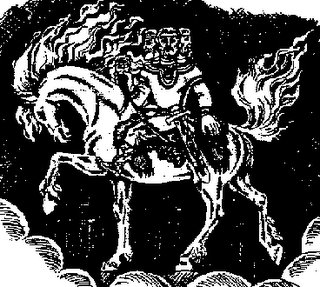Nicolas Copernicus-Astronomer
His origional Polish name is Mikolaj Kopernik in the
 world he is known as Nicolas Copernicus, he was born on February 19th in 1473 in Torun, Poland. He went to the University in Krakow and spent a decade in Italy, studying law and mathematics. A canon of the cathedral at Frombork, Poland Copernicus carried out administrative duties and, from his house, observed the stars and planets. For years he worked on his theory that the planets in our solar system revolved around the sun (Ptolemy of ancient Greece had explained that the universe was a closed system revolving around the earth, and the Catholic church concurred). Hesitant to publish his work for fear of being charged with heresy, Copernicus summarized it in 1530 and circulated it among Europe's scholars, where it was greeted with enthusiasm. His work, titled De revolutionibus orbium coelestium was finally published in 1543. He was the first human being that established the sun at the center of the universe. Later he died couple months after his discovery on May 24th in 1953.
world he is known as Nicolas Copernicus, he was born on February 19th in 1473 in Torun, Poland. He went to the University in Krakow and spent a decade in Italy, studying law and mathematics. A canon of the cathedral at Frombork, Poland Copernicus carried out administrative duties and, from his house, observed the stars and planets. For years he worked on his theory that the planets in our solar system revolved around the sun (Ptolemy of ancient Greece had explained that the universe was a closed system revolving around the earth, and the Catholic church concurred). Hesitant to publish his work for fear of being charged with heresy, Copernicus summarized it in 1530 and circulated it among Europe's scholars, where it was greeted with enthusiasm. His work, titled De revolutionibus orbium coelestium was finally published in 1543. He was the first human being that established the sun at the center of the universe. Later he died couple months after his discovery on May 24th in 1953.Work Cited: "Nicolas Copernicus." Who2? Biographies. Who2?, 2006. Answers.com 21 Jan. 2007. http://www.answers.com/topic/nicolas-copernicus
Fryderyk Chopin-Pianist
 Fryderyk Chopin born on March 1, 1810 in the capital of Poland in Warsaw. He was raised in Warsaw by his father who was French, and his mother who was Polish. By the age of eight he was recognized as a child prodigy, performing in elegant salons and beginning to write his own pieces. In 1826 he enrolled at the University of Warsaw. He gave his first recital in Vienna, Austria in 1829, and over the next few years he performed at home and through much of Germany, Austria and as well in Paris. Later on in 1832 he settled in Paris and established himself as an exorbitantly paid piano teacher. Later on his extrodinary works established him to become one of the most famous and recogniazable pianist of all time. In Paris he composed extensively, but limited his performances mainly to private salons. By the mid-1840s, though, his health and romantic situation both had deteriorated. Chopin then made an extended visit to the British Isles, but returned to Paris to die in 1849 of bad health.
Fryderyk Chopin born on March 1, 1810 in the capital of Poland in Warsaw. He was raised in Warsaw by his father who was French, and his mother who was Polish. By the age of eight he was recognized as a child prodigy, performing in elegant salons and beginning to write his own pieces. In 1826 he enrolled at the University of Warsaw. He gave his first recital in Vienna, Austria in 1829, and over the next few years he performed at home and through much of Germany, Austria and as well in Paris. Later on in 1832 he settled in Paris and established himself as an exorbitantly paid piano teacher. Later on his extrodinary works established him to become one of the most famous and recogniazable pianist of all time. In Paris he composed extensively, but limited his performances mainly to private salons. By the mid-1840s, though, his health and romantic situation both had deteriorated. Chopin then made an extended visit to the British Isles, but returned to Paris to die in 1849 of bad health.
Work Cited: "Frédéric Chopin." Classical Artist Biographies. All Media Guide, 2006. Answers.com 21 Jan. 2007. http://www.answers.com/topic/fr-d-ric-chopin
Pope John Paul II
Karol Wojtyla was elected pope on 16 October 1978, becoming the Catholic Church's first non- Italian pope in over 450 years and history's first Slavic pope. He took the name John Paul II as a nod to his predecessor, John Paul I, whose term lasted only one month. John Paul II became known particularly for his traveling ways and for increasing the international presence of the papacy; as pope he visited more than 100 countries worldwide. He was also known as a champion of human rights and for his conservative positions on social issues like abortion, homosexuality and contraception. In 1998 he marked his 20th year as pope, making him the longest-serving pope of the 20th century. By then, John Paul II was struggling with increasingly poor health, visibly suffering from the slurred speech and trembling hands of Parkinson's Disease. In February of 2005, John Paul II had a tracheotomy after being taken to the hospital with breathing troubles. He received the last rites of the church on 31 March 2005, after suffering what church officials called "septic shock and a cardio-circulatory collapse" brought on by a urinary tract infection. He died in his apartments at the Vatican on 2 April 2005 and was succeeded by Pope Benedict XVI on 19 April 2005.
Italian pope in over 450 years and history's first Slavic pope. He took the name John Paul II as a nod to his predecessor, John Paul I, whose term lasted only one month. John Paul II became known particularly for his traveling ways and for increasing the international presence of the papacy; as pope he visited more than 100 countries worldwide. He was also known as a champion of human rights and for his conservative positions on social issues like abortion, homosexuality and contraception. In 1998 he marked his 20th year as pope, making him the longest-serving pope of the 20th century. By then, John Paul II was struggling with increasingly poor health, visibly suffering from the slurred speech and trembling hands of Parkinson's Disease. In February of 2005, John Paul II had a tracheotomy after being taken to the hospital with breathing troubles. He received the last rites of the church on 31 March 2005, after suffering what church officials called "septic shock and a cardio-circulatory collapse" brought on by a urinary tract infection. He died in his apartments at the Vatican on 2 April 2005 and was succeeded by Pope Benedict XVI on 19 April 2005.

POLISH MYTHOLOGY (SLAVIC MYTHOLOGY)
Associated with war and divination. Described as a four-headed god with two heads looking front and two back. A statue portraying the god shows him with four heads, each one looking in a separate direction, a symbolical representation of the four diections of the compass, and also perhaps the four seasons of the year. He always carries his sword or sometimes a bow in one hand, and in the other a drinking horn. Świętowit had a white horse which was kept in his temple and taken care of by priests. It was believed Świętowit rode this horse in battle. The horse was used for divination. Victory in battle, merchant travels and a successful harvest all depended on Świętowit.
Work Cited: "Svetovid." Wikipedia. Wikipedia, 2005. Answers.com 22 Dec. 2006. http://www.answers.com/topic/svetovid
Dziewanna is the Slavic equivalent of the Roman Goddess Diana. Her name derives from Slavic language translate to "The Maiden." She is more widespread in Slavic countries, whereas in other cultures she is a minor deity. In Polish mythology, she is the virginal Goddess who is the huntress of the forest, in some legends, said to run through the Carpathians and in others with a pack of dogs, and is associated with the Moon, spring, agriculture and weather.
Work Cited: "Dziewona." Wikipedia. Wikipedia, 2005. Answers.com 22 Dec. 2006. http://www.answers.com/topic/dziewona




0 Comments:
Post a Comment
<< Home